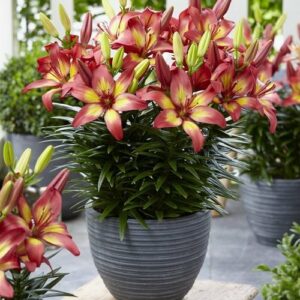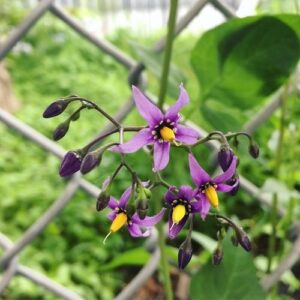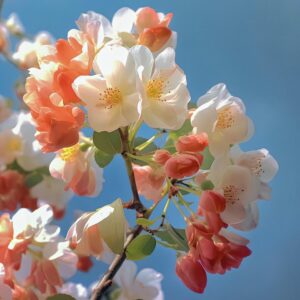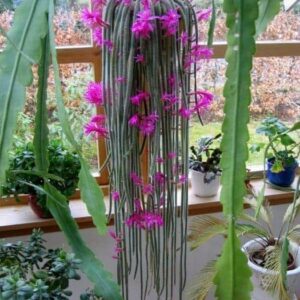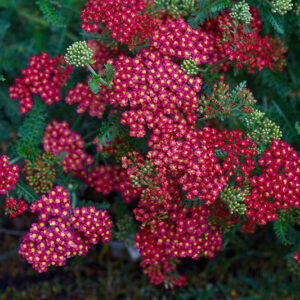Discover the ultimate compilation of Flowers that Symbolize Family, which capture the essence of unbreakable bonds and cherished unity amongst kin. Delve into the symbolic meanings and stunning aesthetics of these blooms that commemorate the bond of love, resilience, and harmony within familial relationships. Get your hands on this exclusive list of Flowers that Represent Family. Also, don’t miss out on our handpicked selection of 24 Most Beautiful Flowers For Sending.
Flowers that Represent Family
1. Roses

The botanical name for roses is Rosa, and they are widely recognized as the top flower to symbolize family. It’s no secret that roses represent love, but they also serve as a meaningful gesture towards loved ones, especially those in the family circle. As a physical manifestation of respect and appreciation, roses convey a powerful message of affection without the need for words.
Another flower that evokes feelings of family and nostalgia is the lilac. While not as popular as roses, lilacs offer their own unique charm and beauty. For those interested in learning how to grow roses from bouquets, there are various guides available to help with the process.

Scientific Name: Gardenia
Gardenias have a symbolic meaning of purity and grace, representing the beauty and elegance of nature. They are often associated with love and romance due to their sweet fragrance and delicate appearance. Growing gardenias can add an enchanting touch to any garden, bringing to mind a sense of serenity and tranquility. Discover tips on how to cultivate gardenias by reading our guide on How to Grow Gardenias.

Gardenia jasminoides is the scientific name of the gardenia flower. It is known to symbolize joy, purity, and sweetness, making it an ideal choice for new families looking to add beauty to their garden. Gardenias have a universal significance, representing the strong bond between families and are often used in wedding ceremonies as a symbol of unity. If you want to learn how to grow gardenias in pots, check out our guide. Another beautiful flower worth mentioning is the Azalea.

Rhododendron is the scientific name of the next flower that embodies the concept of family. Azaleas not only signify attractiveness but also familial ties and harmony. Their grouped blossoms represent the unbreakable connections amongst family members. For those who want to cultivate azaleas in pots, here are some tips. Lastly, carnations are another flower to consider as they also hold significant meaning related to family.

The scientific name for carnations is Dianthus caryophyllus, and they have a long-standing tradition as a popular addition to bouquets and gifts. Carnations are particularly meaningful when it comes to family, with white carnations representing pure love and good luck, and pink carnations symbolizing a mother’s love. Red carnations are a symbol of admiration and respect, and are also believed to embody the essence of life, good fortune, and luck. Moving on to another beautiful flower, peonies deserve a mention as well.

Scientific Name: Tulipa
Tulips are a symbol of elegance and grace, representing perfect love and unity. They hold great significance in strengthening relationships and fostering togetherness within families as they embody the essential qualities of joy, beauty, and prosperity.

Flower Name:
Daisy
Daisies have long been associated with purity and innocence. They are often given as gifts to express sentiments of love, loyalty, and appreciation. Daisies also represent new beginnings and hope, making them a popular choice for welcoming a new baby or starting a new chapter in life. Their bright and cheerful appearance adds a touch of happiness to any occasion.

Scientific Name: Hydrangea
Hydrangeas are beautiful flowers that have their own unique symbolic meanings. They are often associated with heartfelt emotions and can represent gratitude, appreciation, and sincerity. These blooms also convey a sense of understanding, making them the perfect gift for someone who needs a listening ear or a compassionate heart. The hydrangea’s delicate petals and vibrant colors make it a popular choice for gardens and floral arrangements alike.

Kellogggarden provided information about the Hydrangea plant. This plant is known for its symbolic meanings in Japan, which include understanding, grace, family, and harmony. Additionally, it is a suitable flower for reconciliation as it conveys apologetic sentiments. Hydrangeas are also symbols of heartfelt emotions, gratitude, appreciation, and represent love, understanding, and strong family bonds. For those interested in growing this plant, Kellogggarden has provided a guide to everything you need to know. On another note, the article also briefly mentions Yarrow as another plant to consider.

The botanical name for yarrow is Achillea millefolium. Yarrow is also a symbol of family and has beautiful flowers that can last for weeks. If carefully dried, they can even remain vibrant for months, which adds to their reputation as a symbol of eternal love. Moving on to tiger lilies…

Lilium lancifolium, commonly known as Tiger lilies, are famous for their stunning orange and black stripes that embody good fortune, bravery, and affluence. These flowers are associated with safeguarding, just like the stripes of a tiger. They are frequently exchanged as presents, expressing gratefulness and affection amongst family members. Moving on to another flower, let’s talk about violets.

Scientifically referred to as Viola odorata, the delightful and aromatic violet symbolizes loyalty and devotion which are closely linked with family values. Moving on to another flower, we have the sunflower.

The plant with the botanical name Helianthus annuus, or commonly known as sunflower, embodies the true meaning of family. It represents affection, commitment, and reverence, making it an ideal flower for Mother’s Day arrangements and lively family gardens that thrive under the sun’s warmth. If you want to cultivate sunflowers on your balcony, here are some tips to help you get started. Additionally, another beautiful flower that you can grow is the daffodil.

The botanical name for daffodils is Narcissus. Daffodils are an ideal choice to represent family as their cheerful yellow color and unique trumpet shape resemble the happiness and voice of a loved one. Moving on to iris…

The iris, scientifically known as Iris, has been a symbol of elegance and family for centuries. It is often seen in heraldry and coat of arms, representing the strength and unity within a family. The iris is an excellent representation of the unbreakable bond between family members. Moving on to the next plant, we have the Lotus.

The plant known as Nelumbo nucifera is commonly referred to as the lotus, and it is famous for its symbolic representation of purity, enlightenment, and rebirth. In addition to its spiritual connotations, the lotus has a deep connection to family, which is particularly evident in Chinese culture. Displaying this flower in one’s home is believed to bring good fortune and luck to the household, emphasizing its role in promoting positive familial relationships. If you’re interested in growing lotus plants, here are some tips to get started. And lastly, poppy is another type of plant worth exploring.

Scientific Name: Pelargonium
In Greek mythology, the geranium is not particularly significant. However, in modern times, it has become a popular plant for its bright and colorful blooms. The geranium is often associated with friendship, making it a great gift to give to a close friend. Its ability to thrive in different climates and conditions also makes it a versatile and resilient plant. Despite not having a mythical history, the geranium has earned its place in gardens and homes around the world.

The scientific name for geraniums is Pelargonium. Throughout history, geraniums have symbolized family and their importance is apparent. These plants are strong and adaptable, much like families that value stability and consistency. Giving geraniums as a gift can be a sentimental way to show gratitude and love towards cherished family members. If you want to grow geraniums all year round indoors, here’s how to do it.

